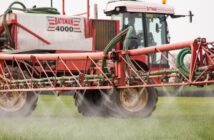An ambitious Land Use Framework (LUF) needs to give food production the same priority as delivering legislated environmental targets, otherwise the ability to continue producing food for the nation could be put at risk, the NFU has warned.
In its submission to Defra’s consultation on the LUF, the NFU argues that that food production cannot be overlooked despite the competing demands for land use, including housebuilding, energy, leisure and recreation and critical national infrastructure.
The NFU says it wants to lay the firm foundations for a sustainable and profitable future, supported by a multi-functional land use strategy. First and foremost is a target for British food production, just as the government has rightly legislated for targets on the environment.
NFU President Tom Bradshaw said: “With the UK population set to increase by 10% by 2050, the huge number of competing demands for land use, including housebuilding, energy, leisure and recreation, and critical national infrastructure, will only continue to grow.
“The geopolitical tensions and the vulnerability of global food supply chains, alongside an unpredictable climate and extreme weather, are making food production at home and abroad so much harder. We should not be adding to this by taking land out of production and assuming we can maintain the same levels of production.
“As the government has repeatedly stated, food security is critical to the nation’s resilience, so it’s vital we invest in homegrown food production and ensure we make the best use of every hectare of our agricultural land.
“That’s why we’re asking for targets for British food production and for our countryside to remain a multifunctional, dynamic space; one that creates a thriving, profitable farming industry and enables Britain’s farmers and growers to produce sustainable, affordable food alongside carrying out important work for the environment and nature recovery, creating more jobs and supporting greener energy security. We cannot allow food to become the poor relation.”
Mounting farming pressures
Mr Bradshaw also highlighted the huge pressures UK farming has faced over the past 18 months, with farm businesses also held back by domestic policies.
He added: “We have taken a battering; volatile input costs, higher employer national insurance rates, reductions in direct payments and the family farm tax have all left their mark. The closure of the Sustainable Farming Incentive (SFI) has also threatened the livelihoods of numerous farmers, especially upland farmers and tenants, and undermined the ability of farm businesses to produce food and deliver environmental services.
“But we now have the opportunity, through the LUF, to make the best use of our most productive agricultural land. As we highlight in the NFU Blueprints, by investing in British farming – the backbone of the food and drink sector – which contributes £148 billion to the national economy, we can lay the foundations for the future of our industry, so farmers can continue producing food alongside caring for the precious environment and deliver the growth our economy badly needs.
“Alongside this, we need a trade policy with a robust system of core standards for food imports that protect farmers and consumers from imported food that would be illegal to produce here.”




